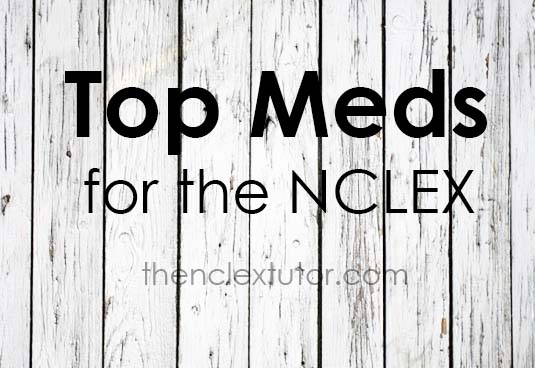Updated January 2024
- Anti-hypertensives: Betablockers – decrease BP and HR: (end in -LOL)
- Anti-hypertensives: Calcium channel blockers – decreases BP and HR: (end in -DIPINE)
- 2 random CCBs are diltiazem and verapamil
- Cardiac glycoside: digoxin: decreases HR
- Anti-depressants: (SSRIs, like fluoxeTINE)
- Anti-anxiety: (end in -LAM or -PAM, like clonazePAM)
- Anti-anginals (have the word NITRATE or NITRO in it)
- Insulins: (all of them: rapid, short, intermediate and long)
- Oral anti-diabetic: metformin
- Anti-biotics: (most of them: cephalosporins, pencillins, fluoroquinolones and aminoglycosides)
- Pain meds: (narcotics/opioids and analgesics: opioids have the word MORPH in them; acetaminophen and NSAIDs like ibuprofen)
- Naloxone: antidote to opioids
- Diuretics: (all of them: thiazides, loop and K-sparing)
- Bronchodilators: (short acting, like –ALBUTEROL; and long-acting like -ipraTROPIUM)
- Steroids (end in -SONE or -LONE)
- Anti-neoplastics (not the specific meds, just the nursing considerations and side effects as a group)
- Anti-coagulants: warfarin & heparin; apixibAN, dabigatrAN, rivaroxabAN
- Anti-platelet: aspirin
- Anaphylaxis: epinephrine
- Anti-dysrhythmia: amiodarone
- Thyroid: levothyroxine
- Stool softener: docusate sodium
- Anti-cholesterol meds: (end in -STATIN)

For each of the classifications/meds, know these important points:
- The classifications and the generic names
- What the med is for and which system it affects
- The nursing considerationsbefore, during and after you give the med
- these are things like knowing which vitals signs to take, labs to look at, any contraindications, and monitoring for side effects
- The side effects
- Don’t memorize a list of side effects. Instead, remember the nursing consideration along with the side effect.
- An example is knowing that a beta blocker has the side effect of low blood pressure and low heart rate. Therefore, your nursing consideration is to check the blood pressure and heart rate before you give it. If the blood pressure is below 100/60 or heart rate is less than 60, you wouldn’t give it.
Many students don’t know what they need to know for the meds. That’s why as my student, you use the NCLEX Nursing Nugget Pages. These nugget pages tell you exactly what you need to know while leaving out all the fluff.
At the very least, know what the med is FOR. This alone can help you get to the right answer.
Any meds you think I’m missing? Put them in comments section.
Find it helpful? Please share it!
Those informations are very helpful
Hi All,
It would be appreciated if any one can help me to crack NLCEX Exam.
Planning to give in feb 2024.
PATELKRUPA7741@GMAIL.COM
I am preparing for nclex too and needs help please
Hi, my name is Lise, and I will take the new generation Nclex next month. Do you have any updates for medications? Thank you for your help.
Do you have an updated list for 2022-2023
please email a updated list for 2022-2023
Hello,do you a update for 2022-2023 please
Hi , how are you? Are you a tutor, can you help me to pass exam, my email is cummy32@yahoo.com
Do you have an updated list for 2021?